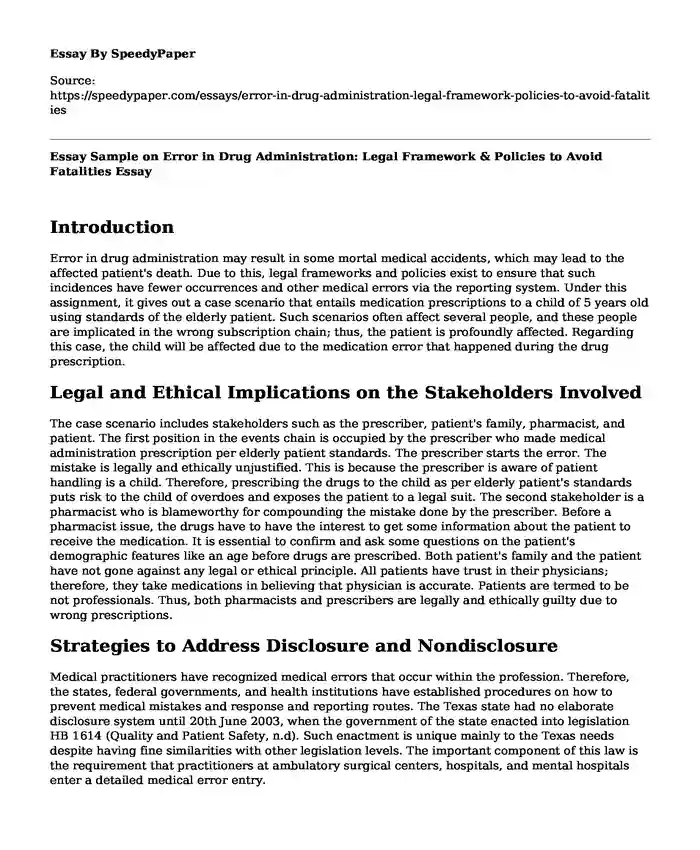Introduction
Error in drug administration may result in some mortal medical accidents, which may lead to the affected patient's death. Due to this, legal frameworks and policies exist to ensure that such incidences have fewer occurrences and other medical errors via the reporting system. Under this assignment, it gives out a case scenario that entails medication prescriptions to a child of 5 years old using standards of the elderly patient. Such scenarios often affect several people, and these people are implicated in the wrong subscription chain; thus, the patient is profoundly affected. Regarding this case, the child will be affected due to the medication error that happened during the drug prescription.
Legal and Ethical Implications on the Stakeholders Involved
The case scenario includes stakeholders such as the prescriber, patient's family, pharmacist, and patient. The first position in the events chain is occupied by the prescriber who made medical administration prescription per elderly patient standards. The prescriber starts the error. The mistake is legally and ethically unjustified. This is because the prescriber is aware of patient handling is a child. Therefore, prescribing the drugs to the child as per elderly patient's standards puts risk to the child of overdoes and exposes the patient to a legal suit. The second stakeholder is a pharmacist who is blameworthy for compounding the mistake done by the prescriber. Before a pharmacist issue, the drugs have to have the interest to get some information about the patient to receive the medication. It is essential to confirm and ask some questions on the patient's demographic features like an age before drugs are prescribed. Both patient's family and the patient have not gone against any legal or ethical principle. All patients have trust in their physicians; therefore, they take medications in believing that physician is accurate. Patients are termed to be not professionals. Thus, both pharmacists and prescribers are legally and ethically guilty due to wrong prescriptions.
Strategies to Address Disclosure and Nondisclosure
Medical practitioners have recognized medical errors that occur within the profession. Therefore, the states, federal governments, and health institutions have established procedures on how to prevent medical mistakes and response and reporting routes. The Texas state had no elaborate disclosure system until 20th June 2003, when the government of the state enacted into legislation HB 1614 (Quality and Patient Safety, n.d). Such enactment is unique mainly to the Texas needs despite having fine similarities with other legislation levels. The important component of this law is the requirement that practitioners at ambulatory surgical centers, hospitals, and mental hospitals enter a detailed medical error entry.
This strategy's importance is its ability to rise surveillance on frequent errors made by practitioners and the power of the errors to take legal actions. The strategy can be adapted to detect and punish the practitioners who are liable for uncontrolled negligence. Besides, the strategy can reveal racketeer practitioners who made entrance to the profession with no prerequisite qualifications, quasi, or under-training practitioners. The healthcare sector needs to emphasize medical error recording and legal frameworks implementation to deal with their cases in the courts and underscore medical error treatment seriousness. The use of this strategy will help the practitioner improve his attention and minimize patient deaths.
Strategies for Decision Making in This case Scenario and Error Disclose
The honesty and integrity principles control the situation response. These two principles govern how a practitioner relates to ethics professions and codes of conduct. Thus, using professional ethics and codes are the main strategies to retaliate to the case scenario. For example, ethical principles like Kantian deontology describe morality or ethics as actions based on law rules regardless of the impacts on the work's recipient and actor (Barrow, 2019). Therefore, based on the case, reporting the scenario is required by the state of law. I will then have to file a medical error report per the principle of ethics. The Code of conduct explains how the doctor has to relate to the patient. For example, applying the Code of doing well in all circumstances, by responding to the case, would need entering a report and fast child tracking to ensure management of the threat.
The Process of Writing Prescriptions
Both the pharmacist and practitioner have to consider considerations and reports of the laboratory of the patient's demographic features before drugs' prescription. Analyses of variables, in this case, inform the drug type and dosage given to the patient by the practitioner. Besides, a reexamination of the prescription is needed to ensure it matches the needs of the patient. Therefore, the practitioner has to accept his or her faults if they lack experience or knowledge of the prescription. By ensuring this, reduce the drug error, which results from ego.
References
Barrow, J. M., & Khandhar, P. B. (2019). Deontology. In StatPearls [Internet]. StatPearls Publishing. https://nursinganswers.net/assignments/influences-of-law-and-ethics-on-professional-health-practices.php
Quality and Patient Safety. (n.d). Public and Private Policy Medical Errors and Patient Safety. https://www.ncbi.nlm.nih.gov/books/NBK2652/
Cite this page
Essay Sample on Error in Drug Administration: Legal Framework & Policies to Avoid Fatalities. (2023, Nov 30). Retrieved from https://speedypaper.com/essays/error-in-drug-administration-legal-framework-policies-to-avoid-fatalities
Request Removal
If you are the original author of this essay and no longer wish to have it published on the SpeedyPaper website, please click below to request its removal:
- Portrayal of Bipolar Disorder in Silver Linings Playbook, Free Essay
- Essay Example on the Aprima Medical Software
- Behavioural Change Essay Sample
- Essay Sample on the Relationship Between Nursing Leaders' Emotional Intelligence and Patient Safety
- Lyme Disease: Oral Exam Diagnosis For Meg - Essay Sample
- Essay Sample on Stable Chronic Schizophrenia
- Free Paper Example on Influenza
Popular categories





